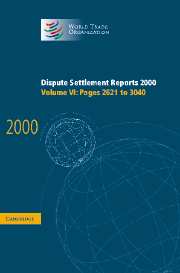Book contents
- Frontmatter
- Contents
- United States - Imposition of Countervailing Duties on Certain Hot-Rolled Lead and Bismuth Carbon Steel Products Originating in the United Kingdom (WT/DS138): Report of the Panel
- Canada - Certain Measures Affecting the Automotive Industry (WT/DS139, WT/DS142): Report of the Appellate Body
Canada - Certain Measures Affecting the Automotive Industry (WT/DS139, WT/DS142): Report of the Appellate Body
Published online by Cambridge University Press: 22 December 2017
- Frontmatter
- Contents
- United States - Imposition of Countervailing Duties on Certain Hot-Rolled Lead and Bismuth Carbon Steel Products Originating in the United Kingdom (WT/DS138): Report of the Panel
- Canada - Certain Measures Affecting the Automotive Industry (WT/DS139, WT/DS142): Report of the Appellate Body
Summary
INTRODUCTION
Canada, the European Communities and Japan appeal certain issues of law and legal interpretations in the Panel Report, Canada - Certain Measures Affecting the Automotive Industry (the “Panel Report”). The Panel was established to consider a complaint by the European Communities and Japan with respect to a Canadian measure which provides a duty exemption for the importation of certain automobiles, buses and other specified commercial vehicles (“motor vehicles”). According to the Panel, the Canadian measure consists of the Motor Vehicles Tariff Order, 1998 (the “MVTO 1998”) and Special Remission Orders (the “SROs”) promulgated by the Government of Canada. Pertinent aspects of the Canadian measure are described in Section II below.
The Panel considered claims by the European Communities and Japan that the measure is inconsistent with Article I:1 of the General Agreement on Tariffs and Trade 1994 (the “GATT 1994”); with Article III:4 of the GATT 1994; with Article 2 of the Agreement on Trade-Related Investment Measures (the “TRIMs Agreement ”); with the prohibition on export subsidies under Article 3.1(a) of the Agreement on Subsidies and Countervailing Measures (the “SCM Agreement ”); with the prohibition on subsidies contingent on the use of domestic over imported goods under Article 3.1(b) of the SCM Agreement; with Article II of the General Agreement on Trade in Services (the “GATS”); and with Article XVII of the GATS. The Panel Report was circulated to the Members of the World Trade Organization (the “WTO”) on 11 February 2000.
The Panel concluded as follows: (a) that Canada acts inconsistently with Article I:1 of the GATT 1994; (b) that the inconsistency with Article I:1 of the GATT 1994 is not justified under Article XXIV of the GATT 1994; (c) that Canada acts inconsistently with Article III:4 of the GATT 1994, as a result of the application of the Canadian value added requirements; (d) that the European Communities and Japan failed to demonstrate that Canada acts inconsistently with Article III:4 of the GATT 1994, as a result of the application of the production- to-sales ratio requirements; (e) that Canada acts inconsistently with Article 3.1(a) of the SCM Agreement; (f) that the European Communities and Japan failed to demonstrate that Canada acts inconsistently with its obligations under Article 3.1(b) of the SCM Agreement; (g) that Canada acts inconsistently with Article II of the GATS;
- Type
- Chapter
- Information
- Dispute Settlement Reports 2000 , pp. 2985 - 3040Publisher: Cambridge University PressPrint publication year: 2002
- 10
- Cited by

